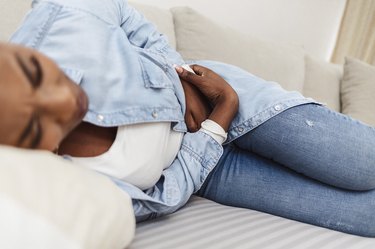
Some people believe the digestive system needs to be detoxified occasionally to promote good health. Proponents suggest a variety of ways to accomplish this cleansing. One way is through a natural colon cleanse, according to the National Center for Complementary and Integrative Health (NCCIH).
Colon cleansing can be done using laxatives, enemas or colonic irrigation (also called colon hydrotherapy), per the NCCIH.
Video of the Day
Video of the Day
But other health experts say colon cleansing isn't necessary and, in fact, may even present risks for people with the intestinal inflammation called diverticulitis.
"Most gastroenterologists [doctors who treat digestive disorders] do not recommend or prescribe colon cleanses," says Arun Swaminath, MD, director of the Inflammatory Bowel Diseases Program at Lenox Hill Hospital in New York City.
"Often, a laxative is required to perform a colonoscopy or to treat constipation symptoms, but there is no implication of 'detoxification' using this strategy," he adds.
Related Reading
What Causes Diverticulitis?
Diverticulitis is a condition that occurs when pouches form in the wall of your colon, in areas that are weakened and stretched out, and become inflamed or infected. When these pouches aren't inflamed, the condition is called diverticulosis, according to the National Institute of Diabetes and Digestive and Kidney Diseases (NIDDK).
Diverticulosis is a common condition. About a third of people 50 and younger in the United States have these intestinal pouches, per the NIDDK. Once Americans are 60 and older, the condition affects more than half of them.
Not everyone who has diverticulosis gets sick. Many people don't even have symptoms from diverticulosis, according to the NIDDK.
If you do have symptoms, you may notice:
- Changes in bowel movements (diarrhea or constipation)
- Bloating
- Abdominal pain
"Once you have diverticula, they will stay with you," Dr. Swaminath says. "I call them the 'barnacles of life.' But generally, they do not cause most people any symptoms. In the rare event they become infected or inflamed, most people will require a short course of antibiotics."
Can Diverticulitis Be Dangerous?
If you do experience inflammation or infection, it's important to take it seriously. Diverticulitis sends about 200,000 Americans to the hospital every year, according to the NIDDK.
People with diverticulitis may develop:
- Intestinal bleeding
- Infections in other areas of the abdomen
- A hole in the colon (perforation)
- A blockage in the intestine
Colonic Irrigation Benefits and Risks
To undergo colon hydrotherapy, a tube is inserted into your rectum, according to the Mayo Clinic. Warm water is then sent through the tube — as much as 60 liters of water during the whole procedure. Herbal products or other substances may be added to the water.
Waste products leave your body through the tubing as well. There are no scientifically proven benefits for this process.
"Colon cleanses are not standardized, so they may contain different substances in the irrigation, such as coffee or lots of water," Dr. Swaminath says about the potential risks of a colon cleanse for someone with diverticulitis. "They have been reported to cause abdominal pain, dehydration and perforation that requires surgery to correct."
Colonic irrigation may cause diarrhea, anal irritation, nausea, vomiting, dizziness, infection, and in some cases low levels of essential electrolytes, according to the Mayo Clinic.
Related Reading
What Can I Do to Prevent Diverticulitis?
Because diverticulosis is so common, experts suspect highly processed foods that are common in the Western diet may play a role, Dr. Swaminath says. He suggests a high-fiber diet for people with diverticulitis once symptoms improve.
Beans, whole grains, fruits and vegetables are all healthy sources of fiber, according to the NIDDK. In general, you should aim for about 28 grams of fiber daily.
- National Center for Complementary and Integrative Health: "'Detoxes' and 'Cleanses:' What You Need to Know"
- Arun Swaminath, MD, director, Inflammatory Bowel Diseases Program, Lenox Hill Hospital, New York, New York
- National Institute of Diabetes and Digestive and Kidney Diseases: "Diverticular Disease"
- Mayo Clinic: "Is colon cleansing a good way to eliminate toxins from your body?"
Is this an emergency? If you are experiencing serious medical symptoms, please see the National Library of Medicine’s list of signs you need emergency medical attention or call 911.